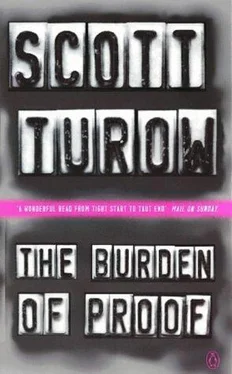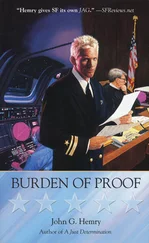Scott Turow - The Burden of Proof
Здесь есть возможность читать онлайн «Scott Turow - The Burden of Proof» весь текст электронной книги совершенно бесплатно (целиком полную версию без сокращений). В некоторых случаях можно слушать аудио, скачать через торрент в формате fb2 и присутствует краткое содержание. Жанр: Детектив, на английском языке. Описание произведения, (предисловие) а так же отзывы посетителей доступны на портале библиотеки ЛибКат.
- Название:The Burden of Proof
- Автор:
- Жанр:
- Год:неизвестен
- ISBN:нет данных
- Рейтинг книги:3 / 5. Голосов: 1
-
Избранное:Добавить в избранное
- Отзывы:
-
Ваша оценка:
- 60
- 1
- 2
- 3
- 4
- 5
The Burden of Proof: краткое содержание, описание и аннотация
Предлагаем к чтению аннотацию, описание, краткое содержание или предисловие (зависит от того, что написал сам автор книги «The Burden of Proof»). Если вы не нашли необходимую информацию о книге — напишите в комментариях, мы постараемся отыскать её.
The Burden of Proof — читать онлайн бесплатно полную книгу (весь текст) целиком
Ниже представлен текст книги, разбитый по страницам. Система сохранения места последней прочитанной страницы, позволяет с удобством читать онлайн бесплатно книгу «The Burden of Proof», без необходимости каждый раз заново искать на чём Вы остановились. Поставьте закладку, и сможете в любой момент перейти на страницу, на которой закончили чтение.
Интервал:
Закладка:
"John wanted a name, I gave him a name," said Peter. He withdrew the needle and flicked the vial with a certain pesky discontent. "Mel's competent, isn't he? What did I do wrong? You already told John you didn't want to get involved."
How typical, Stern thought. His fault, his shortcomings. A quarreling voice, in which Stern would explain the ethical concerns that had led him to treat John as he had, died unuttered. What was the point? He had already come out second best again wth his family.
He had some thought of suggesting dinner, but Peter showed him out directly, taking Stern past the small consultation room, where the medical charts were heaped on his desk, weighed down by the black-corded dictaphone handset.
Outside, in the parking lot, Stern was struck by the sight of Peter's office, now the only bright window in the black solid square of the medical center.
As a child, Peter had had a magnificent singing voice-sweet and pure like some perfect liquid. His vocal range was reduced by adolescence, when his sound became rougher and quavering. But at the age of seven or eight Peter often performed in school plays and community theaters. d about Kate.
"I thought you went to the ball game with her the other night, Looks great, doesn't she?"
"Actually, her looks concerned me," said Stern. "There is a difficult situation at hand. The circumstances are such that I must be somewhat removed, but I fear it is affecting her."
"I've heard about that," said Peter quiefiy. Stern had come with 'no intention of raising the matter of Tooley. What was done was done, and besides, it would be unprofessional for Stern to complain. Yet they proceeded into disagreement as if commanded by nature. It turned out that Iate in her concern for her husband had involved her brother. The thought that the situation had required her to turn to Peter rather than him wounded Stern unexpectedly:
"John wanted a name, I gave him a name," said Peter. He withdrew the needle and flicked the vial with a certain pesky discontent. "Mel's competent, isn't he? What did I do wrong? You already told John you didn't want to get involved."
How typical, Stern thought. His fault, his shortcomings. A quarreling voice, in which Stern would explain the ethical concerns that had led him to treat John as he had, died unuttered. What was the point? He had already come out second best again wth his family.
He had some thought of suggesting dinner, but Peter showed him out directly, taking Stern past the small consultation room, where the medical charts were heaped on his desk, weighed down by the black-corded dictaphone handset.
Outside, in the parking lot, Stern was struck by the sight of Peter's office, now the only bright window in the black solid square of the medical center.
As a child, Peter had had a magnificent singing voice-sweet and pure like some perfect liquid. His vocal range was reduced by adolescence, when his sound became rougher and quavering. But at the age of seven or eight Peter often performed in school plays and community theaters. With his musical talents, he had found one more way to beguile Clara. She became a genuine stage mother who attended each performance in a quiet nervous heat. Stern came along now and then, uncertain about how to behave. From the back of the auditorium, he would watch the small figure onstage. By some vestigial parental instinct, Stern believed that those had been the happiest moments of Peter's life, alone, admired, standing within the sole spot of light in the dark room, and bringing forth that lilting, expressive voice-he controlled every word, every note, filling his song with an emotional range unusual for a child of his age.
That was the past, Peter's past, that time of expression, attention, performance. Through the dark, Stern looked up to the light where his son, hard on the way through his own adulthood, would go on into the night, alone, the only sound his toughened voice mumbling out the details of the medical charts.
BRACE'S cabin was built along a wash. From the roadside, you saw only the roof coated with moss, glowing chartreuse in the brilliant sun, and the tin chimney pipe. Bumping along in his Cadillac in an astonishing fog of dust, Stern would have gone past it, except for the wooden sign knocked at an angle into the yellow ground. He had already been down and up, rapping on the door, nosing to the window, where he saw nothing but darkness. Below, by the house, the over of the trees -oak, pine, cottonwood, birch-was deep, the forest floor dark and moist, barely penetrated by light. As he climbed back up to the road, the sun was intense. I the gravel parking area, Stern searched for other tire tracks. The red flag stood raised on the round aluminum mailbox.
What was he doing here? He had awakened with a hopeful spurt. The thought of driving north through the sloping valleys, beyond the state line and the congested blight of urban life-his urban Ylfe-inspired expansive feelings.
Now in the heat, far more intense here on the plains, he was full of doubts. Had he really driven two hours for a fifteen-minute conversation that in all likelihood would not occur? He would accomplish nothing beyond a moment's discomfort for both of them.
Thinking better of that, Sonny had probably decided not to come. He'sat up on the car trunk with his face to the sun-the first lick of scorching summer heat he had felt-and then, when he grew uncomfortably warm, trudged down again and scouted about the cabin.
It could not have been more than three rooms, perhaps only two. Down in the wash, it was bordered on two sides by a deep veranda in which half the punky boards had been replaced; the roof was supported by greenish treated standards. At the farthest comer, where the wild bushes and other growth of the ravine rose against the house, a round contraption had been carved into the porch. Stern bent to inspect the knobs and rubber hoses; there was a canvas cover across it.
He was there when he heard the gravel spurned above. By the time he walked around, Sonny Klonsky was charging down the stairs from the roadside. Her arms were full, with two grocery bags and half a dozen children's books, and seeing Stern, she bothered with no greeting but threw him, rather, a harried conspiratorial look of complete exasperation. The door to the cabin proved to be unlocked and she ran inside.
The ride apparently had been a long one for a woman midterm.
When Stern turned about, a boy was watching him, five or six years old, wearing a striped T-shirt and blue jeans, a dark-eyed, freckle-faced fellow with a bowl-shaped do of perfect silky haft and a look of cheerless curiosity.
"Sam?" asked Stern. He never had any idea how he remembered these things.
The boy toed the dirt and shied away. Stern climbed the ties braced into the earth, which formed the stairway up, prepared to greet Sam's father. The boy had climbed into the front seat of an old yellow Volkswagen, a convertible, where there was no other passenger. Stern asked about his father and the boy murmured an inaudible response. "Not coming?" asked Stern.
Sam, chin tucked down, waggled his head.
"No." Sonny spoke behind Stern and moved somewhat wearily back into the sun. "The poet's in climacteric, or whatever it is. The grip of inspiration." She pulled Sam by the shoulder from the car and introduced him to Stern, then reached into the back seat. There were two sleeping bags there, more groceries, and a single large piece of softsided luggage. Stern helped her carrad the items down to the cabin. "I hope you did not make this trip simply for me."
"I came for Sam," said Sonny. Entering the stale-smelling dark of the cabin, she faced Stern with a look that did not fully contain the nerve of her lingering anger. "And his father can go fuck himself."
"Oh, dear," said Stern.
Читать дальшеИнтервал:
Закладка:
Похожие книги на «The Burden of Proof»
Представляем Вашему вниманию похожие книги на «The Burden of Proof» списком для выбора. Мы отобрали схожую по названию и смыслу литературу в надежде предоставить читателям больше вариантов отыскать новые, интересные, ещё непрочитанные произведения.
Обсуждение, отзывы о книге «The Burden of Proof» и просто собственные мнения читателей. Оставьте ваши комментарии, напишите, что Вы думаете о произведении, его смысле или главных героях. Укажите что конкретно понравилось, а что нет, и почему Вы так считаете.












